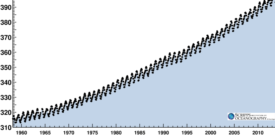Anna:
Jon Stewart gives the best explanation I’ve seen of cognitive dissonance and how it plays out: Two rats in a bag!
And in related cognitive dissonance news: Want partisans to listen to ideas that contradict their views? Give them an ego boost.
Our other big pollution problem: Antibiotics.
The Heartland Institute went too far lumping mass murderers and terrorists with everybody who’s concerned about climate change. A bunch of their backers are pulling away.
Clark:
Back when I was a wee lad, a more productive economy meant a more prosperous middle class. Whenever technological advances made it possible to squeeze more value out of an hour of labor, employers would pay more for a worker’s time—and everyone saw some benefit from rising productivity.
But starting in the mid-1970s, the ties that bound wages to productivity began to unravel, first slowly and then catastrophically. Today there’s virtually no connection between a more productive economy and a more prosperous middle class.
Which leads to a big question: where’s the missing prosperity? In a new report, the Economic Policy Institute tries to solve the riddle of why wages aren’t keeping up with productivity. They identify three separate culprits, which have differed in importance over time:
1) Inequality of compensation—compared with the old days, a smaller share of workers captures the benefits of productivity gains
2) Shifts in labor’s share of income—A larger portion of the economy’s gains are being captured as profits (by the people who own factories, equipment, stores, etc.) rather than as wages.
3) A divergence between consumer prices and output prices—This is a somewhat technical shift…but in short, things that consumers buy are getting expensive faster than the things that workers make. (The price of microprocessors and machine tools—things that consumers don’t buy a lot of—are going up more slowly than, say, food, clothing, and shelter…which drives a wedge between real productivity and real earnings.)
For even more geeky goodness, you should check out EPI’s most recent edition of The State of Working America.
Top speed: 25mph. Range: 30 miles. Power source: electricity. Number of wheels: 1. That’s right, a Portland-area plans to start marketing an electric-powered, self-balancing unicycle. Segway owners eat your hearts out.
The invisible borders that define American Culture.
Alan:
Gain a powerful sense of scale about everything from Planck units to the scale of the observable universe, all from a scroll bar. Click on objects to learn more about them.
The most interesting thing I read in Sightline Daily all week was this post from Atlantic Cities about what heavy car traffic and inadequate infrastructure for walking and cycling does to children’s sense of safety and awareness of their surroundings.
Eric dP:
I enjoyed reading the new Bernie Sanders-Keith Ellison bill, called the “End Polluter Welfare Act.” The list of subsidies – no, strike that – rip-offs from taxpayers is breathtaking to behold. And enraging, in part because it presumably has a snowball’s chance in hell of getting even a vote.
Speaking of being enraged, it was fortuitous that by way of Sightline’s friend Kathyrn Malý, I stumbled upon a quote from MLK that I’d long forgotten. I’m not sharing it apropos of anything in particular, yet it doesn’t seem there’s ever a bad time for this reminder:
As you press on for justice, be sure to move with dignity and discipline, using only the weapon of love. Let no man pull you so low as to hate him. Always avoid violence. If you succumb to the temptation of using violence in your struggle, unborn generations will be the recipients of a long and desolate night of bitterness, and your chief legacy to the future will be an endless reign of meaningless chaos.
– Martin Luther King, Jr., 1956
It was with that thought in mind that I came across Ernest Callenbach’s parting words, recovered posthumously from his hard drive:
Learn to live with contradictions. These are dark times, these are bright times. We are implacably making the planet less habitable… We are turning more land into deserts and parking lots. We are wiping out innumerable species that are not only wondrous and beautiful, but might be useful to us… And yet, despite the bloody headlines and the rocketing military budgets, we are also, unbelievably, killing fewer of each other proportionately than in earlier centuries. We have mobilized enormous global intelligence and mutual curiosity, through the Internet and outside it. We have even evolved, spottily, a global understanding that democracy is better than tyranny, that love and tolerance are better than hate, that hope is better than rage and despair, that we are prone, especially in catastrophes, to be astonishingly helpful and cooperative.
And those contradictions just about sum up the Obama era for me.







